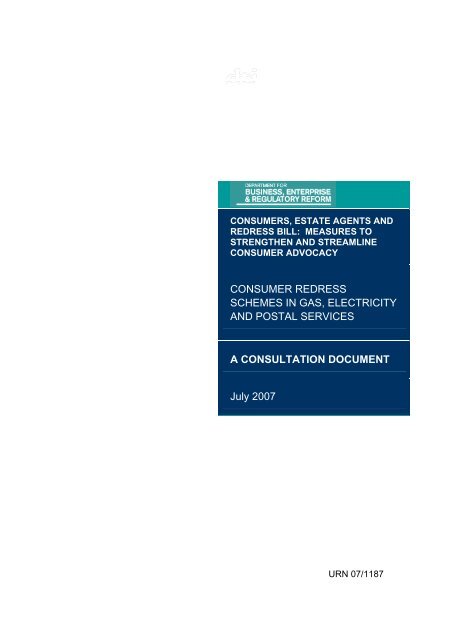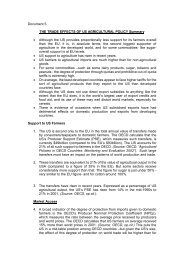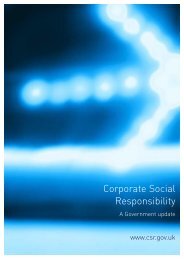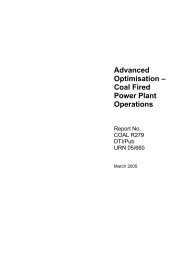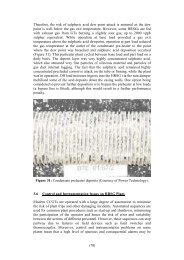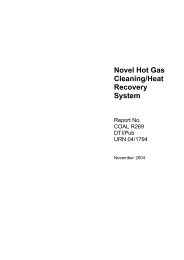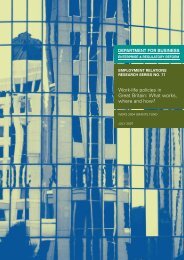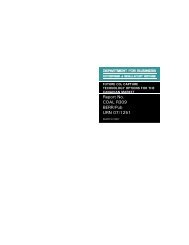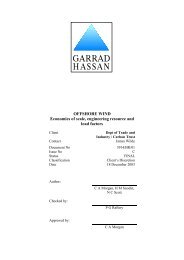CONSUMER REDRESS SCHEMES IN GAS ... - DTI Home Page
CONSUMER REDRESS SCHEMES IN GAS ... - DTI Home Page
CONSUMER REDRESS SCHEMES IN GAS ... - DTI Home Page
Create successful ePaper yourself
Turn your PDF publications into a flip-book with our unique Google optimized e-Paper software.
<strong>CONSUMER</strong>S, ESTATE AGENTS AND<br />
<strong>REDRESS</strong> BILL: MEASURES TO<br />
STRENGTHEN AND STREAML<strong>IN</strong>E<br />
<strong>CONSUMER</strong> ADVOCACY<br />
<strong>CONSUMER</strong> <strong>REDRESS</strong><br />
<strong>SCHEMES</strong> <strong>IN</strong> <strong>GAS</strong>, ELECTRICITY<br />
AND POSTAL SERVICES<br />
A CONSULTATION DOCUMENT<br />
July 2007<br />
URN 07/1187
Why BERR is conducting this consultation<br />
The Consumers, Estate Agents and Redress Bill, which is currently before<br />
Parliament, includes provisions for consumers to benefit from new, statutory,<br />
redress schemes to resolve problems with their gas, electricity, or postal<br />
services providers.<br />
The Bill provides for the Secretary of State to make an order that requires<br />
some or all of the categories of regulated providers of these services to<br />
belong to a redress scheme that is approved by their relevant regulators. The<br />
order may also provide that the requirement applies only to kinds of consumer<br />
complaints specified for example by reference to:<br />
(a) the subject matter of a complaint or<br />
(b) the description of the persons making the complaint.<br />
The purpose of this consultation is to seek views on proposals in these areas.<br />
This consultation therefore sets out proposals for the regulated providers of<br />
gas electricity and postal services to belong to redress schemes in relation to<br />
certain kinds of complaints specified on the basis of the subject matter of the<br />
complaints, and the description of complainant, and invites comments.<br />
Issued 05 July 2007<br />
Respond by 27 September 2007<br />
Enquiries to Consumer Redress Consultation,<br />
Address Department for Business, Enterprise and Regulatory<br />
Reform,<br />
Response Centre,<br />
1 Victoria Street,<br />
London<br />
SW1H 0ET<br />
Email redress.consultation@dti.gsi.gov.uk
<strong>CONSUMER</strong> <strong>REDRESS</strong> <strong>SCHEMES</strong> <strong>IN</strong> <strong>GAS</strong>, ELECTRICITY AND POSTAL<br />
SERVICES<br />
1 Introduction<br />
2 Complaint handling standards<br />
CONSULTATION DOCUMENT<br />
CONTENTS<br />
3 Better complaint handling for consumers<br />
4 Summary of Government Proposals<br />
5 How to Respond<br />
6 Redress schemes under the Consumers, Estate Agents and Redress<br />
Bill<br />
7 Defining the regulated service providers who should be required to<br />
belong to an approved redress scheme<br />
8 Defining the provisions of the Order relating to kinds of consumer<br />
complaints<br />
9 Description of complainants to be specified in the Order<br />
10 Subject matter of complaints to be specified in the Order<br />
11 Next steps<br />
Annex A Summary of questions<br />
Annex B Consultation Code of Practice<br />
Annex C Consultation response form<br />
Annex D List of organisations consulted.
<strong>REDRESS</strong> <strong>SCHEMES</strong><br />
1 Introduction<br />
1.1 The Consumers, Estate Agents and Redress Bill sets out a new<br />
framework for consumer advocacy, with the establishment of a new National<br />
Consumer Council, which in turn must establish the Scottish Consumer<br />
Council, Welsh Consumer Council and Northern Ireland Postal Services<br />
Committee to provide a major step forward for stronger, more coherent, and<br />
more effective consumer advocacy.<br />
1.2 The Bill also provides for the establishment of new, statutory, redress<br />
schemes to resolve consumer complaints in - initially – the gas, electricity and<br />
postal services sectors. The Government has announced that the position of<br />
consumer representation and redress in the water sector in England and<br />
Wales will be the subject of a separate consultation in 2008.<br />
1.3 Redress schemes in general provide consumers with resolution of their<br />
complaints against suppliers of goods and services, where the suppliers have<br />
failed to resolve the complaints to the consumer’s satisfaction. They are<br />
independent of consumers and of suppliers. The redress schemes can reach<br />
an impartial judgment on complaints that are referred to them, and can reach<br />
a decision which is binding on the supplier.<br />
1.4 Where a decision made by a redress scheme is in the consumer’s<br />
favour, the decision may specify that the supplier should provide an apology<br />
or explanation; pay compensation; or take such other action in the interests of<br />
the consumer as may be specified.<br />
1.5 Redress schemes are already well established in other sectors,<br />
including telecommunications and financial services, and around the world.<br />
The schemes may take different forms: the best known are probably those<br />
known as “ombudsman” schemes, but other forms of redress schemes are<br />
operational in the United Kingdom. Redress schemes are also known as<br />
“Alternative Dispute Resolution” or “ADR” schemes.<br />
1.6 The Energy Supply Ombudsman was established in July 2006 to<br />
resolve outstanding billing disputes. The ESO was set up by the energy<br />
suppliers who were members of the Energy Retail Association, following a<br />
determination by the Office of Gas and Electricity Markets in 2005, in<br />
response to a supercomplaint by Energywatch on billing issues. In practice,<br />
the ESO potentially covers approximately 80% of consumer complaints,<br />
based on the type of complaints made to Energywatch.<br />
1.7 This consultation will address the scope of the proposed new statutory<br />
redress schemes by reference to the regulated service providers who should<br />
be required to be members of the schemes; the description of complainants<br />
who should be covered by the schemes and the subject matter of the<br />
complaints which should be dealt with by the schemes.
2 Complaint handling standards<br />
2.1 As part of the Government’s goal to strengthen and streamline<br />
consumer representation, the Bill places two new requirements on regulated<br />
providers in the energy and postal sectors. Regulated providers will be<br />
required to become members of an approved redress scheme, and will be<br />
subject to prescribed complaint handling standards. The Bill places a new<br />
duty on Ofgem, the gas and electricity regulator, and Postcomm, the postal<br />
services regulator, to prescribe complaint handling standards for their<br />
licensees, the regulated service providers. These two new requirements<br />
should be viewed together, as both will be critical to the success of the new<br />
arrangements.<br />
2.2 The specific standards will be prescribed and set by way of regulations,<br />
following consultation as required by the Bill, and subject to the consent of the<br />
Secretary of State. The development of the new complaint handling<br />
standards will be the subject of separate consultations by the regulators.<br />
3 Better complaint handling for consumers<br />
3.1 Taken together, the complaint handling standards and the redress<br />
schemes represent a change in the way in which consumer complaints in gas,<br />
electricity, postal services and – in future – water will be addressed under the<br />
new arrangements. Responsibility for handling complaints will rest with the<br />
regulated providers. It will be necessary for regulated providers to deal<br />
effectively with complaints from their customers, to at least the minimum<br />
standards set by regulators, within their own organisations and – if necessary<br />
- through the redress schemes.<br />
3.2 This approach represents a departure for some sectors, where – for<br />
over twenty years – there have been public bodies charged with handling<br />
complaints which the regulated providers have not addressed to the<br />
satisfaction of their customers. The new arrangements give regulated<br />
providers an incentive to invest in resolving complaints through their internal<br />
procedures rather than having to take matters to redress schemes for<br />
resolution<br />
3.3 The new National Consumer Council will have a role to assist<br />
vulnerable consumers, who are defined as those whom the new Council<br />
considers cannot be expected to pursue a complaint on their own behalf. The<br />
Bill provides powers for the new Council to give assistance to vulnerable<br />
consumers by providing advice or by making representations on their behalf.
4 Summary of Government proposals<br />
4.1 It is proposed that the regulated providers in the gas, electricity and<br />
postal services sectors should be required to become members of a redress<br />
scheme.<br />
4.2 It is further proposed that the description of complainants who should<br />
be covered by the redress schemes for gas, electricity, and postal services<br />
should be domestic and micro-enterprise consumers, where:<br />
(a) domestic consumer means an individual who purchases, uses,<br />
or receives, in Great Britain, goods or services which are supplied in<br />
the course of a business by a regulated provider, or an individual in<br />
Northern Ireland who purchases, uses or receives postal services from<br />
a regulated provider; and<br />
(b) micro-enterprise consumer is an enterprise with a headcount of<br />
less than 10, and whose annual turnover and/or annual balance sheet<br />
total does not exceed €2 million.<br />
4.3 It is proposed that the complaints to be included within the scope of the<br />
redress schemes should be those which:<br />
(a) have been considered by the service provider, and not resolved<br />
to the satisfaction of the consumer;<br />
(b) relate to the regulated products and services of the service<br />
provider, as provided to the complainant, unless there is an established<br />
alternative route for resolution of the particular class of complaint;<br />
(c) concern complaints about the way in which the service provider<br />
handled the initial complaint;<br />
(d) concern complaints where there was no evidence to support the<br />
complaint, but which were not handled by the service provider in<br />
accordance with an established standard or code of practice.
5 How to Respond<br />
The Department for Business, Enterprise and Regulatory Reform invites<br />
views on any aspect raised in this document and, in particular, where views<br />
have been specifically requested.<br />
This consultation opened on 05 July 2007. The last date for responses is 27<br />
September 2007.<br />
When responding please state whether you are responding as an individual or<br />
representing the views of an organisation. If responding on behalf of an<br />
organisation, please make it clear who the organisation represents and,<br />
where applicable, how the views of members were assembled. Written<br />
responses can be submitted by letter, fax or (preferably) e-mail to:<br />
Consumer Redress Consultation,<br />
Department for Business, Enterprise and Regulatory Reform<br />
Response Centre<br />
1 Victoria Street<br />
London<br />
SW1H 0ET<br />
Fax: 00 44 (0) 20 7215 6100<br />
E-mail: redress.consultation@dti.gsi.gov.uk<br />
A copy of the consultation response form is enclosed at Annex B. The<br />
Department will also be able to arrange for hard copies, or other languages or<br />
copies in Braille to be provided if necessary. Further copies of the electronic<br />
consultation document and the response form can be obtained from the<br />
DBERR website - www.berr.gov.uk/consultations/Open/index.html<br />
A list of those organisations and individuals consulted is at Annex C. We<br />
would welcome suggestions for others who you think may wish to be involved<br />
in this consultation process.<br />
Confidentiality<br />
Information provided in response to this consultation, including personal<br />
information, may be subject to publication or disclosure in accordance with the<br />
access to information regimes (these are primarily the Freedom of Information<br />
Act 2000 (FOIA), the Data Protection Act 1998 (DPA) and the Environmental<br />
Information Regulations 2004). If you want other information that you provide<br />
to be treated as confidential, please be aware that, under the FOIA, there is a<br />
statutory Code of Practice with which public authorities must comply and<br />
which deals, amongst other things, with obligations of confidence.<br />
In view of this it would be helpful if you could explain to us why you regard the<br />
information you have provided as confidential. If we receive a request for
disclosure of the information we will take full account of your explanation, but<br />
we cannot give an assurance that confidentiality can be maintained in all<br />
circumstances. An automatic confidentiality disclaimer generated by your IT<br />
system will not, of itself, be regarded as binding on the Department.<br />
The Department will process your personal data in accordance with the DPA<br />
and in the majority of circumstances this will mean that your personal data will<br />
not be disclosed to third parties.<br />
Complaints<br />
If you have any comments or complaints about the way this consultation has<br />
been conducted, these should be sent to:<br />
Nick Cooper<br />
Consultation Co-ordinator<br />
Department for Business, Enterprise and Regulatory Reform<br />
Bay 56.<br />
1 Victoria Street<br />
London<br />
SW1H 0ET<br />
E-mail Nick.Cooper@dti.gsi.gov.uk<br />
Tel (0) 20 7215 0346<br />
See Annex A for the Consultation Code of Practice<br />
Additional copies<br />
You may make copies of this document without seeking permission.<br />
Queries<br />
Queries on the issues raised in this consultation should be addressed to the<br />
BERR Response Centre at the contact details above.<br />
If you foresee any unintended consequences or other implications of our<br />
proposals please let us know what you believe these may be.
6 Redress schemes under the Consumers, Estate Agents and<br />
Redress Bill<br />
6.1 The Bill gives the Secretary of State the power to require “regulated<br />
providers” of specified services to be required to belong to a “qualifying<br />
redress scheme”. This is explained in the Bill as follows:<br />
(a) regulated providers are licensed electricity suppliers, electricity<br />
distributors, gas suppliers, gas transporters, postal service providers;<br />
and – in future – water undertakers, sewerage undertakers, or licensed<br />
water suppliers;<br />
(b) a redress scheme means a scheme under which consumer<br />
complaints may be made to, and investigated and determined by, an<br />
independent person;<br />
(c) an independent person is one who is independent of the<br />
regulated provider and the relevant regulator for the sector<br />
(d) a qualifying redress scheme is one which has been approved by<br />
the relevant regulator for the sector, or one which is administered by<br />
the Secretary of State.<br />
6.2 Redress schemes provide consumers with the means to obtain<br />
resolution and redress for complaints in cases where the regulated provider<br />
has not been able to resolve the complaint to the consumer’s satisfaction.<br />
The Bill specifies a minimum range of forms of redress which must be<br />
available to a complainant, comprising provision of an apology or explanation;<br />
payment of compensation; or taking such other action in the interests of the<br />
complainant as the independent person may specify.<br />
6.3 Redress schemes do not provide any additional, duplicated, sets of<br />
rules against which the performance of service providers are judged. The<br />
requirements on regulated providers are already set out in a number of ways,<br />
examples of which are given below:<br />
(a) primary and secondary legislation;<br />
(b) licence conditions;<br />
(c) multi-lateral agreements or codes of practice, which may be<br />
required under licence conditions;<br />
(d) contracts;<br />
(e) voluntary codes of practice established by business sectors or<br />
by individual regulated providers,
(f) standards of performance set out in regulations;<br />
(g) internal procedures adopted by regulated providers to provide<br />
service to their customers.<br />
6.4 But redress schemes should not be focused on infringements of<br />
broadly regulatory requirements alone. Whilst any such infringement may<br />
give rise to an adverse impact on a consumer, and hence a complaint, the<br />
main focus should be on the impact on consumers of the licensed service or<br />
products provided, and any detriment to consumers as a consequence of any<br />
acts or omissions by the regulated provider. A complaint by a consumer to a<br />
redress scheme might possibly relate to:<br />
(a) the quality of performance by the regulated provider of one of<br />
the relevant requirements set out in legislation, licence, code of<br />
practice, agreement, or similar instrument;<br />
(b) any aspect of the administration by the regulated provider of the<br />
services provided directly or indirectly to the consumer;<br />
(c) any aspect of the regulated provider’s services or<br />
communications with the consumer;<br />
(d) any services provided to other consumers, the execution of<br />
which have a perceived adverse impact on the consumer bringing the<br />
complaint;<br />
where, in each case, the consumer has been unable to obtain satisfactory<br />
resolution of the complaint from the regulated provider.<br />
6.5 Although the redress schemes will not create new rules for the<br />
performance of functions by regulated providers, the process of resolution of<br />
complaints by the redress schemes will provide valuable feedback for the<br />
regulated providers. This feedback should inform their own internal policies<br />
and procedures, enabling regulated providers to avoid similar difficulties with<br />
other consumers and improve both their own commercial performance and,<br />
importantly, their general standard of performance to consumers.<br />
7 Defining the regulated service providers who should be required<br />
to belong to an approved redress scheme.<br />
7.1 In regulated sectors, complaints may arise as a result of a range of<br />
issues which – under legislation and licences – are the responsibility of a<br />
number of different regulated providers. Clause 42 of the Bill 1 defines the<br />
range of regulated providers of services in the gas, electricity and postal<br />
1<br />
Consumers, Estate Agents and Redress Bill, as amended in Public Bill Committee, and<br />
printed 24 April 2007
services sectors who might be included within the scope of the requirement to<br />
be members of a redress scheme as:<br />
(a) persons holding a licence under section 7(A)1 of the Gas Act<br />
1986 (gas suppliers)<br />
(b) persons holding a licence under section 7(2) of the Gas Act<br />
1986 (gas transporters)<br />
(c) persons holding a licence under section 6(1)(d) of the Electricity<br />
Act 1989 (electricity suppliers)<br />
(d) persons holding a licence under section 6(1)(c) of the Electricity<br />
Act 1989 (electricity distributors)<br />
(e) persons holding a licence under Part 2 of the Postal Services<br />
Act 2000 (postal services providers).<br />
7.2 As complaints can arise in respect of any of these regulated providers,<br />
we propose to include all of the regulated providers within the scope of the<br />
redress schemes.<br />
7.3 Question:<br />
1 Is there a case for omitting any class of regulated provider from<br />
the list of those proposed to be included in the requirement to be<br />
members of a redress scheme?<br />
8 Defining the provisions of the Order relating to kinds of consumer<br />
complaint<br />
8.1 There is, of course, a range of options for defining the kinds of<br />
consumer complaints, for example in terms of the description of complainant<br />
and the subject matter of complaints that should be covered by the statutory<br />
redress schemes. The spectrum ranges from all complaints from all<br />
consumers, to specific complaints from a small, defined, group of consumers.<br />
8.2 In order to assist with this definition, it is worth considering some<br />
general principles.<br />
(a) Business consumers<br />
It is likely that many large and medium-sized business consumers will<br />
have sufficient commercial power to resolve problems directly with<br />
regulated providers and will not want to seek redress through statutory<br />
schemes. Their services may be provided under contracts, backed up<br />
by specialist staff with the skills to monitor and assess the performance<br />
of the service providers against these contracts. These business<br />
consumers are likely to be able to use their commercial position to<br />
resolve complaints, or to have the freedom and expertise to seek<br />
alternative service providers. For such consumers, it could be argued<br />
that redress schemes would not provide any significant benefit, and<br />
accordingly that they should not be included within the scope of the<br />
redress schemes.
(b) Domestic consumers<br />
There is likely to be general agreement that domestic consumers<br />
should be included within the scope of any redress scheme. Domestic<br />
consumers may, individually, lack the commercial power and the<br />
specialist skills to negotiate on an equal footing with a regulated<br />
provider, and – in the postal services market, for example – may not<br />
have easy access to an alternative regulated provider for the time<br />
being.<br />
(c) Complaints with existing resolution mechanisms<br />
Where complaints of a particular type have an established mechanism<br />
in legislation for resolution or redress, we should not seek to add a<br />
further, parallel, scheme of redress. Examples include the guaranteed<br />
standards of performance in gas and electricity, which provide for<br />
automatic compensation of specified amounts where consumers have<br />
suffered a loss of supply for a period. These forms of compensation<br />
are set out in regulations. The redress schemes do not need to cover<br />
the same ground, but might become involved in cases where<br />
compensation has not been paid under the regulations, and a<br />
consumer considers that it should have been, or in cases which are not<br />
covered by the regulations. Another example is that of disputes over<br />
charges quoted by gas or electricity distribution companies for<br />
connection to a network. In legislation, there is an established role for<br />
Ofgem to determine the charge in the event of a dispute, and there<br />
would appear to be no need to resolve that complaint in a redress<br />
scheme.<br />
(d) Complaints without an evidence base<br />
Most complaints have an evidence root which can be used for<br />
consideration of the merits of the case: the evidence will be in bills or<br />
records, for example. In some cases, there will be no evidence base.<br />
Examples include consumers posting letters in letter boxes which are<br />
then lost in the post. There is no receipt for the collection of the letter<br />
by the postal system and no evidence of it having been posted. In<br />
these cases, the regulated provider could have a code of practice for<br />
dealing with the complaints, or the issue could be covered in complaint<br />
handling standards set by the regulators. Reference of a complaint to<br />
the redress scheme could then be made on an administrative basis:<br />
that the regulated provider failed to follow the code of practice or<br />
standard.<br />
8.3 These general principles set out a broad framework within which the<br />
detailed scope issues can be addressed.<br />
9 Description of complainants to be specified in the Order<br />
9.1 Taking as the starting point the inclusion within the scope of all<br />
domestic consumers, but excluding large businesses, there is a need to
identify an appropriate threshold to separate those businesses which should<br />
be included from the “large” businesses.<br />
9.2 There is an argument that micro-enterprises have the same lack of<br />
commercial power as domestic consumers. In gas and electricity markets,<br />
micro-enterprises may have similar levels of energy consumption as larger<br />
domestic consumers, for example. And small business consumers may face<br />
very similar problems and have similar complaints to those of domestic<br />
consumers.<br />
9.3 Micro-enterprises are defined as those with a headcount of less than<br />
10, and whose annual turnover and/or annual balance sheet total does not<br />
exceed €2 million. Small businesses are those which employ fewer than 50<br />
persons, and whose annual turnover and/or annual balance sheet total does<br />
not exceed €10 million. Medium-sized businesses are those with a headcount<br />
of less than 250, and turnover of €50 million or less or a balance sheet total of<br />
€43 million or less. 2<br />
9.4 Other distinctions are possible, particularly in gas and electricity, where<br />
there are thresholds based on consumption or meter type. In gas, there is a<br />
commonly used threshold of 2,500 therms (73,200kWh) consumption per<br />
annum, which is used to distinguish domestic and small business from larger<br />
industrial and commercial consumers.<br />
9.5 There is certainly potential to delineate the description of consumers to<br />
be included in the redress schemes on an individual basis, with different<br />
criteria for a scheme covering gas and electricity from one dealing with postal<br />
services. But we should also bear in mind the possible need for a redress<br />
scheme for the water industry in England and Wales after the Government<br />
consultation in 2008. The Telecommunications Ombudsman Service<br />
(OTELO) deals with domestic and small business consumers.<br />
9.6 In order to avoid uncertainty for consumers over whether they are<br />
eligible for their complaints to be considered under the redress schemes for<br />
different sectors, it is prudent to adopt a definition of eligibility which can cover<br />
all sectors. The definition must also allow for consumers, particularly<br />
vulnerable consumers, to be represented by a third party when taking a<br />
complaint to a redress scheme.<br />
9.7 The definition of consumers in the Bill is very wide: in relation to the<br />
core functions of the Council, for example, these may be exercised in respect<br />
of all consumers without limitation. In relation to redress schemes, the<br />
provisions enable particular descriptions of complainants (or consumers) to be<br />
identified as those in respect of whom a supplier will be required to join a<br />
redress scheme. It is proposed that the description of complainant who<br />
should be specified in the Order as those in respect of whom service<br />
providers would be required to belong to a redress scheme should be<br />
domestic and micro-enterprise consumers, where:<br />
2 Recommendation 2003/361/EC.
(a) domestic consumer means an individual who purchases, uses,<br />
or receives, in Great Britain, goods or services which are supplied in<br />
the course of a business by a regulated provider, or an individual in<br />
Northern Ireland who purchases, uses or receives postal services from<br />
a regulated provider; and<br />
(b) micro-enterprise consumer is an enterprise with a headcount of<br />
less than 10, and whose annual turnover and/or annual balance sheet<br />
total does not exceed €2 million.<br />
9.8 In the case of both domestic and micro-enterprise consumers, it is<br />
envisaged that complaints could be accepted from persons – including agents<br />
– acting on behalf of the consumer.<br />
9.9 Questions:<br />
2 Do you consider that the description of complainant to be<br />
covered by redress schemes should be domestic and micro-enterprise<br />
consumers?<br />
3 Are there any reasons for considering the addition of any other<br />
description of complainants?<br />
4 Is the proposed method of defining the threshold of microenterprise<br />
consumers included in the proposed scope the right one?<br />
Are there other, simpler, or established ways of defining the threshold<br />
which would still provide clarity and certainty for consumers across<br />
different sectors?<br />
5 Is there any advantage in considering different thresholds for<br />
micro-enterprises for redress schemes in different sectors, or is that<br />
outweighed by the risk of uncertainty and added complexity for<br />
consumers?<br />
10 Complaints to be specified in the Order<br />
10.1 Consideration of the scope for the types of complaints to be specified<br />
in the Order should start from the basis that the complaints should be:<br />
a complaint which is made against a regulated provider by or on behalf<br />
of a person in that person’s capacity as a relevant consumer in relation<br />
to the regulated providers (from clause 42(2) of the Bill); where<br />
the service provider has had an opportunity to investigate and resolve<br />
the complaint, but it has not been resolved to the satisfaction of the<br />
consumer.
10.2 As discussed in section 7 above, any complaints on issues which have<br />
specific existing resolution schemes ought to be referred to the appropriate<br />
other scheme save in the circumstances described below. Classes of<br />
complaints which of their nature have no evidence base could be covered by<br />
a code of practice or by complaints handling standards set by the relevant<br />
regulators. Accordingly, redress schemes could consider complaints from<br />
consumers in cases where, for example, compensation has not been paid<br />
under the other resolution scheme and the consumer considers it should have<br />
been paid, or where the regulated provider has not applied the code or<br />
standard, or has applied it inconsistently or perversely.<br />
10.3 Complaints may arise in relation to the way in which a regulated<br />
provider has dealt with the initial complaint, and that may have led to practical<br />
difficulties for the consumer. That type of complaint should be included within<br />
the scope of the redress scheme.<br />
10.4 It is proposed that the complaints to be specified in the Order should be<br />
those:<br />
(a) which have been considered by the service provider, and not<br />
resolved to the satisfaction of the consumer;<br />
(b) relate to the regulated products and services of the service<br />
provider, as provided to the complainant, unless there is an established<br />
alternative route for resolution of the particular class of complaint;<br />
(c) which relate to the way in which the regulated provider handled<br />
the initial complaint;<br />
(d) where there was no evidence to support the complaint, but<br />
which were not handled by the regulated provider in accordance with<br />
any established standard or code of practice.<br />
10.5 Questions:<br />
6 Do you have any comments on the types of complaints to be<br />
specified in the Order?<br />
7 Do you consider that the schemes should address all of the<br />
issues which might arise from the provisions of relevant services and<br />
supplies by a regulated provider?<br />
8 Are there other kinds of complaints which ought to be included?<br />
9 Is there any reason to exclude specific kinds of complaints,<br />
other than those with an established process for resolution and what<br />
are these?
11 Next steps<br />
11.1 During the consultation period, regulated providers in the gas,<br />
electricity, and postal services sectors will continue with their preparatory work<br />
to plan for the implementation of the new redress schemes, in consultation<br />
with regulators, consumer bodies, and Government.<br />
11.2 Ofgem and Postcomm will be considering the criteria which they will<br />
use in deciding whether to approve redress schemes.<br />
11.3 At the completion of this consultation exercise, Government will set out<br />
its response by 21 December 2007. That response will include, in draft, the<br />
key elements of the Order to be made by the Secretary of State defining the<br />
scope of the redress schemes. That will enable the regulated providers in the<br />
gas, electricity, and postal services markets to complete the preparations for<br />
their schemes. Once the regulators have completed the approval process for<br />
the redress schemes, the Secretary of State will make the Order, and the<br />
schemes will be formally commenced.<br />
11.4 The planned commencement date for the new redress schemes is<br />
Summer 2008. Transitional arrangements for the handling of complaints and<br />
the change to the new arrangements are being planned by the<br />
implementation team at BERR, in conjunction with regulators, consumer<br />
bodies, and the service providers.
Annex A<br />
<strong>CONSUMER</strong> <strong>REDRESS</strong> <strong>SCHEMES</strong> <strong>IN</strong> <strong>GAS</strong>, ELECTRICITY AND POSTAL<br />
SERVICES<br />
Summary of Questions<br />
In this consultation the Government invites responses to the following<br />
questions:<br />
1 Is there a case for omitting any class of regulated provider from<br />
the list of those proposed to be included in the requirement to be<br />
members of a redress scheme?<br />
2 Do you consider that the description of complainant to be<br />
covered by redress schemes should be domestic and micro-enterprise<br />
consumers?<br />
3 Are there any reasons for considering the addition of any other<br />
description of complainants?<br />
4 Is the proposed method of defining the threshold of microenterprise<br />
consumers included in the proposed scope the right one?<br />
Are there other, simpler, or established ways of defining the threshold<br />
which would still provide clarity and certainty for consumers across<br />
different sectors?<br />
5 Is there any advantage in considering different thresholds for<br />
micro-enterprises for redress schemes in different sectors, or is that<br />
outweighed by the risk of uncertainty and added complexity for<br />
consumers?<br />
6 Do you have any comments on the types of complaints to be<br />
specified in the Order?<br />
7 Do you consider that the schemes should address all of the<br />
issues which might arise from the provisions of relevant services and<br />
supplies by a regulated provider?<br />
8 Are there other kinds of complaints which ought to be included?<br />
9 Is there any reason to exclude specific kinds of complaints,<br />
other than those with an established process for resolution and what<br />
are these?
Consultation Code of Practice<br />
Annex B<br />
1 Consult widely throughout the process, allowing a minimum of 12<br />
weeks for written consultation at least once during the development of the<br />
policy.<br />
2 Be clear about what your proposals are, who may be affected, what<br />
questions are being asked and the timescale for responses.<br />
3 Ensure that your consultation is clear, concise and widely accessible.<br />
4 Give feedback regarding the responses received and how the<br />
consultation process influenced the policy.<br />
5 Monitor your department’s effectiveness at consultation, including<br />
through the use of a designated consultation co-ordinator.<br />
6 Ensure your consultation follows better regulation best practice,<br />
including carrying out a Regulatory Impact Assessment if appropriate.<br />
The complete code is available on the Cabinet Office’s web site, address<br />
http://www.cabinetoffice.gov.uk/regulation/consultation/index.asp
List of Organisations Consulted<br />
Office of Fair Trading<br />
HM Treasury<br />
Department for Environment, Food and Rural Affairs<br />
Department of Enterprise Trade and Investment<br />
Postcomm<br />
Ofcom<br />
Ofgem<br />
Ofwat<br />
Financial Services Authority<br />
Office of Rail Regulation<br />
Civil Aviation Authority<br />
National Consumer Council<br />
Scottish Consumer Council<br />
Welsh Consumer Council<br />
General Consumer Council for Northern Ireland<br />
Energywatch<br />
Postwatch<br />
Financial Services Consumer Panel<br />
Ofcom Consumer Panel<br />
Consumer Council for Water<br />
Passenger Focus<br />
Air Transport Users Council<br />
Energy Retail Association<br />
Energy Networks Association<br />
Water UK<br />
National Grid<br />
British Gas<br />
Annex C
Powergen<br />
Scottish Power<br />
EDF Energy<br />
Scottish and Southern Energy<br />
NPower<br />
Royal Mail<br />
Mail Competition Forum<br />
OTELO<br />
Energy Supply Ombudsman<br />
Financial Ombudsman Service<br />
British and Irish Ombudsman Association<br />
Communications and Internet Services Adjudication Scheme<br />
Centre for the study of Regulated Industries<br />
OXERA


